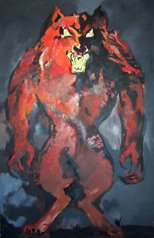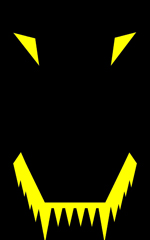Quotations from *Moby-Dick; or, The Whale*, 13 of 22
Herman Melville
1819-1891 American
The glorious, golden, glad sun, the only true lamp -- all others but liars!
—Herman Melville, Moby-Dick; or, The Whale
The sun hides not the ocean, which is the dark side of this earth, and which is two thirds of this earth. So, therefore, that mortal man who hath more of joy than sorrow in him, that mortal man cannot be true -- not true, or undeveloped. With books the same. The truest of all men was the Man of Sorrows, and the truest of all books is Solomon's, and Ecclesiastes is the fine hammered steel of woe. “All is vanity”. ALL. This wilful world hath not got hold of unchristian Solomon's wisdom yet. But he who dodges hospitals and jails, and walks fast crossing grave-yards, and would rather talk of operas than hell; calls Cowper, Young, Pascal, Rousseau, poor devils all of sick men; and throughout a care-free lifetime swears by Rabelais as passing wise, and therefore jolly; -- not that man is fitted to sit down on tomb-stones, and break the green damp mould with unfathomably wondrous Solomon.
—Herman Melville, Moby-Dick; or, The Whale
And there is a Catskill eagle in some souls that can alike dive down into the blackest gorges, and soar out of them again and become invisible in the sunny spaces. And even if he for ever flies within the gorge, that gorge is in the mountains; so that even in his lowest swoop the mountain eagle is still higher than other birds upon the plain, even though they soar.
—Herman Melville, Moby-Dick; or, The Whale
Yes; and many is the time, when, after the severest uninterrupted labors, which know no night; continuing straight through for ninety-six hours; when from the boat, where they have swelled their wrists with all day rowing on the Line, -- they only step to the deck to carry vast chains, and heave the heavy windlass, and cut and slash, yea, and in their very sweatings to be smoked and burned anew by the combined fires of the equatorial sun and the equatorial try-works; when, on the heel of all this, they have finally bestirred themselves to cleanse the ship, and make a spotless dairy room of it; many is the time the poor fellows, just buttoning the necks of their clean frocks, are startled by the cry of “There she blows!” and away they fly to fight another whale, and go through the whole weary thing again. Oh! my friends, but this is man-killing! Yet this is life.
—Herman Melville, Moby-Dick; or, The Whale
Oh! the metempsychosis! Oh! Pythagoras, that in bright Greece, two thousand years ago, did die, so good, so wise, so mild; I sailed with thee along the Peruvian coast last voyage -- and, foolish as I am, taught thee, a green simple boy, how to splice a rope!
—Herman Melville, Moby-Dick; or, The Whale
And some certain significance lurks in all things, else all things are little worth, and the round world itself but an empty cipher, except to sell by the cartload, as they do hills about Boston, to fill up some morass in the Milky Way.
—Herman Melville, Moby-Dick; or, The Whale
“There's something ever egotistical in mountain-tops and towers, and all other grand and lofty things; look here, -- three peaks as proud as Lucifer.”
—Herman Melville, Moby-Dick; or, The Whale
“Born in throes, 't is fit that man should live in pains and die in pangs! So be it, then! Here's stout stuff for woe to work on. So be it, then.”
—Herman Melville, Moby-Dick; or, The Whale
“Yet, oh, the great sun is no fixture; and if, at midnight, we would fain snatch some sweet solace from him, we gaze for him in vain!”
—Herman Melville, Moby-Dick; or, The Whale
“Book! you lie there; the fact is, you books must know your places. You'll do to give us the bare words and facts, but we come in to supply the thoughts.”
—Herman Melville, Moby-Dick; or, The Whale
“Leo, a roaring Lion, lies in the path -- he gives a few fierce bites and surly dabs with his paw; we escape, and hail Virgo, the Virgin! that's our first love; we marry and think to be happy for aye, when pop comes Libra, or the Scales -- happiness weighed and found wanting; and while we are very sad about that, Lord! how we suddenly jump, as Scorpio, or the Scorpion, stings us in rear.”
—Herman Melville, Moby-Dick; or, The Whale
“And to wind up with Pisces, or the Fishes, we sleep. There's a sermon now, writ in high heaven, and the sun goes through it every year, and yet comes out of it all alive and hearty. Jollily he, aloft there, wheels through toil and trouble.”
—Herman Melville, Moby-Dick; or, The Whale
“Ship, ahoy! Hast seen the White Whale?”
So cried Ahab, once more hailing a ship showing English colors, bearing down under the stern. Trumpet to mouth, the old man was standing in his hoisted quarter-boat, his ivory leg plainly revealed to the stranger captain, who was carelessly reclining in his own boat's bow. He was a darkly-tanned, burly, good-natured, fine-looking man, of sixty or thereabouts, dressed in a spacious roundabout, that hung round him in festoons of blue pilot-cloth; and one empty arm of this jacket streamed behind him like the broidered arm of a huzzar's surcoat.
“Hast seen the White Whale?”
“See you this?” and withdrawing it from the fold that had hidden it, he held up a white arm of sperm whale bone, terminating in a wooden head like a mallet.
—Herman Melville, Moby-Dick; or, The Whale
“I was ignorant of the White Whale at that time. Well, one day we lowered for a pod of four or five whales, and my boat fastened to one of them; a regular circus horse he was, too, that went milling and milling round so, that my boat's crew could only trim dish, by sitting all their sterns on the outer gunwale. Presently up breaches from the bottom of the sea a bouncing great whale, with a milky-white head and hump, all crows' feet and wrinkles.”
—Herman Melville, Moby-Dick; or, The Whale
“I didn't then know what whale it was that had served me such a trick, till some time afterwards, when coming back to the Line, we heard about Moby Dick -- as some call him -- and then I knew it was he.”
“Did'st thou cross his wake again?”
“Twice.”
“But could not fasten?”
“Didn't want to try to: ain't one limb enough? What should I do without this other arm? And I'm thinking Moby Dick doesn't bite so much as he swallows.”
—Herman Melville, Moby-Dick; or, The Whale
“No more White Whales for me; I've lowered for him once, and that has satisfied me. There would be great glory in killing him, I know that; and there is a ship-load of precious sperm in him, but, hark ye, he's best let alone; don't you think so, Captain?” -- glancing at the ivory leg.
“He is. But he will still be hunted, for all that. What is best let alone, that accursed thing is not always what least allures.”
—Herman Melville, Moby-Dick; or, The Whale
They were all trumps—every soul on board. A short life to them, and a jolly death.
—Herman Melville, Moby-Dick; or, The Whale
For, as a general thing, the English merchant-ship scrimps her crew; but not so the English whaler.
—Herman Melville, Moby-Dick; or, The Whale
During my researches in the leviathanic histories, I stumbled upon an ancient Dutch volume, which, by the musty whaling smell of it, I knew must be about whalers.
—Herman Melville, Moby-Dick; or, The Whale
For, say they, when cruising in an empty ship, if you can get nothing better out of the world, get a good dinner out of it, at least.
—Herman Melville, Moby-Dick; or, The Whale
Wherefore all these ceaseless toilings?
—Herman Melville, Moby-Dick; or, The Whale
Thursday, May 27, 2010
Subscribe to:
Post Comments (Atom)





No comments:
Post a Comment